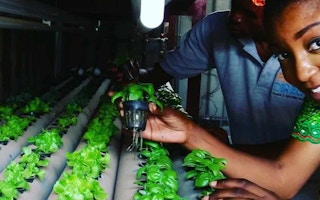The Solve competition, sponsored by the Massachusetts Institute of Technology (MIT), aims to help marginalised communities worldwide strengthen the resilience of their systems for producing and delivering food.
In developed countries such as the United States, many low-income neighbourhoods are struggling with “food deserts”, where pizza, burgers and snacks are the main options available. Throughout the Global South, meanwhile, slums and barrios often have limited access to potable water or fail to provide sufficient choices for a well-rounded diet.
In response, the MIT competition’s aims are threefold. It seeks to promote cost-efficient food production closer to urban populations, extend water distribution infrastructure to the poorest areas, and improve urban supply chains and market access for nutritious food.
[See: In Baltimore and Washington, D. C., fresh thinking about food]
Fifteen finalists were announced 16 August. Voting on their ideas began at the end of the month and continues until 5 p. m. U. S. Eastern Time on 16 September.
The proposals range from mini-farms for congested cities to solutions designed to minimise food and water waste. Among the highlights:
- Urban container farms: Fresh Direct Nigeria plans to use shipping containers as miniature plots in which to grow produce. The goal is to make agriculture “hyper local” by cultivating crops in small batches near cities — and without diminishing land and soil.
- Water metering in Guatemala: Waterbox is an Internet-based water usage and demand system that can lower the costs of delivering this essential resource by minimising waste. The technology relies on sensors and machine-to-machine communication.
- Spoilage detection in the Philippines: StillFresh describes itself as the first spoilage-monitoring test kit for cities in the Asia-Pacific region. Restaurants and warehouses would use colour-changing warning strips to determine if inventory has spoiled. The innovation can protect the public from consuming contaminated food.
- Gastronomy hub for Brazil: Brazil’s Gastromotiva envisions a website that would educate the public about food waste and provide destinations for donated “repurposed” food. The team proposes a two-year city pilot project to “rescue and transform 42 tons of food surplus.”
- Water-saving robots: A US team builds miniature robots that check the inside of water pipes for leaks or other potential hazards. Locating and repairing the leaks can mitigate water shortages and prevent structural damage in cities.
[See: What a city in Spain learned from Sweden about promoting local food and healthier eating]
The contest organisers emphasise that healthier food choices are only half the equation. Cities also need sustainable and resilient methods of food production and delivery. That can mean finding local sources of water or growing crops in ways that are not heavily reliant on fossil fuels.
“For cities to support large populations without overtaxing resources in the long term, they must develop stronger supply chains for water and food,” the university emphasises in its challenge overview.
The Solve competition was launched in 2015 as part of MIT’s commitment to open technological innovation. More details are available here.
This story was published with permission from Citiscope, a non-profit news outlet that covers innovations in cities. More at Citiscope.org.










